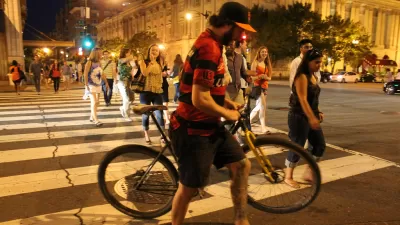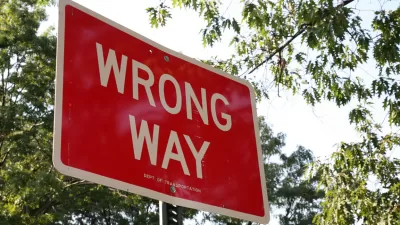Bill Fulton writes for CP&DR that while some Millennials may be driving less because they've chosen urban, transit-friendly lifestyles, many more young people are driving less simply because they can't afford to.

What explains Millennials' trend toward urban living and reduced auto use? It's a little too easy to suggest they're all "urbanistas" who find it suits their personal tastes to live the urban good life in major cities with plentiful transit.
Bill Fulton has been hearing from academics who are looking a little more carefully at the data picture. Quoting work by researchers Brian Taylor, Celsie Ralph, and Trevor Thomas, he says there aren't so many "urbanistas," proportionally speaking. In more cases, if young people aren't driving it's because they can't afford cars.
Further, the two-tier economy is creating a split in the relationship between poverty and driving, depending on geography and access to transit. He writes, "[the] urban poor can survive a downturn because of public transit service, while the suburban poor are chained to their cars just like everybody else – only they have a much tougher time paying their car bills."
FULL STORY: Are Millenials Truly Different -- Or Just Poor?

Alabama: Trump Terminates Settlements for Black Communities Harmed By Raw Sewage
Trump deemed the landmark civil rights agreement “illegal DEI and environmental justice policy.”

Study: Maui’s Plan to Convert Vacation Rentals to Long-Term Housing Could Cause Nearly $1 Billion Economic Loss
The plan would reduce visitor accommodation by 25% resulting in 1,900 jobs lost.

Planetizen Federal Action Tracker
A weekly monitor of how Trump’s orders and actions are impacting planners and planning in America.

Waymo Gets Permission to Map SF’s Market Street
If allowed to operate on the traffic-restricted street, Waymo’s autonomous taxis would have a leg up over ride-hailing competitors — and counter the city’s efforts to grow bike and pedestrian on the thoroughfare.

Parklet Symposium Highlights the Success of Shared Spaces
Parklets got a boost during the Covid-19 pandemic, when the concept was translated to outdoor dining programs that offered restaurants a lifeline during the shutdown.

Federal Homelessness Agency Places Entire Staff on Leave
The U.S. Interagency Council on Homelessness is the only federal agency dedicated to preventing and ending homelessness.
Urban Design for Planners 1: Software Tools
This six-course series explores essential urban design concepts using open source software and equips planners with the tools they need to participate fully in the urban design process.
Planning for Universal Design
Learn the tools for implementing Universal Design in planning regulations.
Caltrans
Smith Gee Studio
Institute for Housing and Urban Development Studies (IHS)
City of Grandview
Harvard GSD Executive Education
Toledo-Lucas County Plan Commissions
Salt Lake City
NYU Wagner Graduate School of Public Service




























